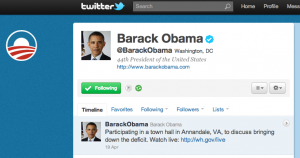Government and Social Networks: Democracy on the Rise?
April 21st, 2011 by
In January, the world media and most of its consumers were riveted as events unfolded in #Egypt as the ouster of Hosni Mubarak gradually unfolded. It may have been the most widely televised, blogged, photographed, and tweeted-about revolution in the history of the planet, as people received up-to-the-second updates as to what was occurring in Cairo.
(Of course, Kenneth Cole unwisely used these events as a way to promote his clothing on Twitter, but that’s neither here nor there.)
Social media, particularly Twitter and Facebook, allowed people all over the world, especially Egyptians (after a nationwide internet blackout was reversed), to voice their concerns, support, and questions regarding the revolution in Tahrir Square. In some ways, one could argue that social media websites allowed the revolution to take place, as people in Egypt could instantly communicate and coordinate with one another. One Egyptian man even named his newborn daughter “Facebook” to signify the network’s importance in coordinating the revolution successfully.
Well, what about our own government? Some might say that our politicians have been slow to capitalize on the connectivity of social media, especially in the Oval Office. Bill Clinton only wrote two emails while in office, George W. Bush didn’t start using social media until after his presidency, but President Obama seems to have staffers controlling communications via Facebook, Twitter, and Hootsuite at all hours of the day, which proved to his advantage in the 2008 election. Many members of Congress have active accounts on these sites as well, and the media in Washington and other political power centers have long established their presence on social networks.
What does this mean? Well, for starters, rather than writing your Congressman, you can now tweet @ him or her and vice versa, opening up a new form of conversation in the political arena. As important legislative deadlines approach, like the budget debate earlier this month, constituents can get instant updates not only as to who’s voting for what, but also concerning behind-the-scenes negotiations and deals that can make-or-break a legislative agenda. The President can live-tweet his speeches and public events as they happen (#SOTU), and he often chooses to announce his press conferences via Twitter. In New Orleans, our mayor even has his own Twitter account and updates it frequently.
What’s even more interesting is that politicians’ use of social networks can essentially cut out the traditional media in the chain of communication between politician and constituent. Rather than having a reporter or broadcaster select and edit the quotes they choose to convey to their readers (we’re all too familiar with “sound bytes” that are taken out of context), politicians now have a direct line to speak to their supporters and discuss their views and actions on their own terms.
However, social media does the same for media outlets as well. Many Washington reporters have their own active Twitter accounts, and certain news organizations, like the New York Times, have them as well. (Hint: if you click on a link leading to any NYT article, you can bypass their new paywall and read it for free. @nytimes #FF)
Does this make American politics more democratic? Absolutely not, but it seemed to have that effect in Cairo. While business on Capital Hill will progress as it always has, social media allows for a deeper focus and scrutiny on political events. One now has greater access to inner workings of our political system and can speak up as speeches are made, negotiations are conducted, and votes tallied. If Egypt, is any indicator, social networks are now becomingly increasingly powerful tools in the political landscape, a trend that can only increase in the future.
(For further reading, check out NPR’s article entitled “Digital Media Could Make Or Break Presidential Race.”)



